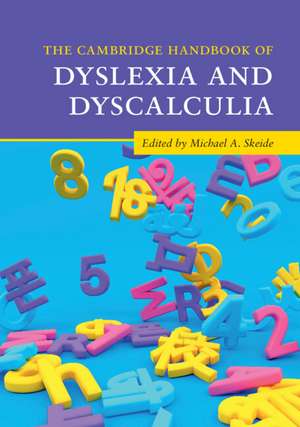The Cambridge Handbook of Dyslexia and Dyscalculia: Cambridge Handbooks in Psychology
Editat de Michael A. Skeideen Limba Engleză Paperback – 27 iul 2022
| Toate formatele și edițiile | Preț | Express |
|---|---|---|
| Paperback (1) | 355.68 lei 3-5 săpt. | +46.55 lei 6-10 zile |
| Cambridge University Press – 27 iul 2022 | 355.68 lei 3-5 săpt. | +46.55 lei 6-10 zile |
| Hardback (1) | 1071.95 lei 6-8 săpt. | |
| Cambridge University Press – 27 iul 2022 | 1071.95 lei 6-8 săpt. |
Din seria Cambridge Handbooks in Psychology
- 23%
 Preț: 1254.71 lei
Preț: 1254.71 lei - 11%
 Preț: 449.49 lei
Preț: 449.49 lei -
 Preț: 502.52 lei
Preț: 502.52 lei -
 Preț: 501.96 lei
Preț: 501.96 lei - 8%
 Preț: 426.60 lei
Preț: 426.60 lei -
 Preț: 486.56 lei
Preț: 486.56 lei - 5%
 Preț: 441.42 lei
Preț: 441.42 lei - 9%
 Preț: 1282.44 lei
Preț: 1282.44 lei -
 Preț: 494.25 lei
Preț: 494.25 lei - 8%
 Preț: 429.69 lei
Preț: 429.69 lei - 5%
 Preț: 397.85 lei
Preț: 397.85 lei - 23%
 Preț: 1246.12 lei
Preț: 1246.12 lei - 5%
 Preț: 439.60 lei
Preț: 439.60 lei - 19%
 Preț: 491.54 lei
Preț: 491.54 lei - 5%
 Preț: 718.49 lei
Preț: 718.49 lei -
 Preț: 511.59 lei
Preț: 511.59 lei - 8%
 Preț: 426.60 lei
Preț: 426.60 lei - 8%
 Preț: 427.05 lei
Preț: 427.05 lei - 8%
 Preț: 425.42 lei
Preț: 425.42 lei -
 Preț: 411.92 lei
Preț: 411.92 lei -
 Preț: 272.35 lei
Preț: 272.35 lei - 8%
 Preț: 425.42 lei
Preț: 425.42 lei - 9%
 Preț: 594.29 lei
Preț: 594.29 lei -
 Preț: 511.21 lei
Preț: 511.21 lei - 23%
 Preț: 1248.79 lei
Preț: 1248.79 lei -
 Preț: 370.88 lei
Preț: 370.88 lei - 8%
 Preț: 424.41 lei
Preț: 424.41 lei -
 Preț: 374.90 lei
Preț: 374.90 lei - 8%
 Preț: 427.49 lei
Preț: 427.49 lei -
 Preț: 511.59 lei
Preț: 511.59 lei - 5%
 Preț: 1538.86 lei
Preț: 1538.86 lei - 23%
 Preț: 2195.06 lei
Preț: 2195.06 lei - 23%
 Preț: 1168.35 lei
Preț: 1168.35 lei - 8%
 Preț: 428.36 lei
Preț: 428.36 lei -
 Preț: 488.47 lei
Preț: 488.47 lei - 8%
 Preț: 420.13 lei
Preț: 420.13 lei - 9%
 Preț: 850.12 lei
Preț: 850.12 lei - 8%
 Preț: 430.05 lei
Preț: 430.05 lei -
 Preț: 497.35 lei
Preț: 497.35 lei -
 Preț: 283.03 lei
Preț: 283.03 lei
Preț: 355.68 lei
Nou
Puncte Express: 534
Preț estimativ în valută:
68.06€ • 71.06$ • 56.20£
68.06€ • 71.06$ • 56.20£
Carte disponibilă
Livrare economică 26 martie-09 aprilie
Livrare express 11-15 martie pentru 56.54 lei
Preluare comenzi: 021 569.72.76
Specificații
ISBN-13: 9781108978118
ISBN-10: 1108978118
Pagini: 420
Dimensiuni: 176 x 253 x 32 mm
Greutate: 1.08 kg
Ediția:Nouă
Editura: Cambridge University Press
Colecția Cambridge University Press
Seria Cambridge Handbooks in Psychology
Locul publicării:New York, United States
ISBN-10: 1108978118
Pagini: 420
Dimensiuni: 176 x 253 x 32 mm
Greutate: 1.08 kg
Ediția:Nouă
Editura: Cambridge University Press
Colecția Cambridge University Press
Seria Cambridge Handbooks in Psychology
Locul publicării:New York, United States
Cuprins
List of Figures and Tables; List of Contributors; Acknowledgements; General introduction Michael A. Skeide; Part I. Theoretical frameworks and computational models: 1. Theories of dyslexia Usha Goswami; 2. Theories of dyscalculia Vinod Menon and Hyesang Chang; 3. Computational models of reading and mathematical difficulties Marco Zorzi & Alberto Testolin; Part II. Cognitive profiles and behavioral manifestations: 4. Cognitive profiles and co-occurrence of dyslexia and dyscalculia Chiara Banfi, Karin Landerl and Kristina Moll; 5. Reading and mathematics anxiety Dénes Szűcs; Part III. Genetic and environmental influences: 6. Genetic and environmental influences on dyslexia and dyscalculia Margherita Malanchini and Agnieszka Gidziela; 7. Pre- and postnatal environmental effects on learning to read and mathematical learning Florence Bouhali and Fumiko Hoeft; Part IV. Neurodevelopmental foundations: 8. Neurogenetic insights into the origins of dyslexia and dyscalculia Michael A. Skeide; 9. Longitudinal neural observation studies of dyslexia Gorka Fraga González, Katarzyna Jednoróg and Silvia Brem; 10. Longitudinal neural observation studies of dyscalculia Karin Kucian and Ursina McCaskey; 11. Neuroplasticity in response to reading intervention Jason D. Yeatman; 12. Neuroplasticity in response to mathematical intervention Teresa Iuculano; Part V. Gender, ethnicity and socioeconomic background: 13. Gender and sex differences in dyslexia and dyscalculia Jessica F. Cantlon; 14. The role of socioeconomic and ethnic disparities for dyslexia and dyscalculia Rachel Fish; Part VI. Cultural unity and diversity: 15. Cross-cultural unity and diversity of dyslexia Wai Ting Siok; 16. Cross-cultural unity and diversity of dyscalculia Baihan Lyu and Xinlin Zhou; Part VII. Early prediction: 17. Early prediction of learning outcomes in reading Arne O. Lervåg and Monica Melby-Lervåg; 18. Early prediction of learning outcomes in mathematics Elizabeth A. Gunderson; Part VIII. Intervention and compensation: 19. Randomized controlled trials in dyslexia and dyscalculia Katharina Galuschka and Gerd Schulte-Körne; 20. Cognitive enhancement and brain stimulation in dyslexia and dyscalculia Nienke E. R. van Bueren, Evelyn H. Kroesbergen and Roi Cohen Kadosh; 21. Persistence and fadeout of responses to reading and mathematical interventions H. Moriah Sokolowski and Lien Peters; Part IX. Best practice: diagnostics and prevention: 22. Diagnosis of dyslexia and dyscalculia: challenges and controversies Thomas Lachmann, Kirstin Bergström, Julia Huber and Hans-Christoph Nürk; 23. Prevention of dyslexia and dyscalculia Marcus Hasselhorn and Wolfgang Schneider; Part X. Best practice: schooling and educational policy: 24. Dyslexia and the dyslexia-like picture: Supporting all children in primary school Sonali Nag; 25. Best practice and policy in math education in school Antje Ehlert and Luisa Wagner; General summary Michael A. Skeide; References; Index.
Descriere
An accessible, authoritative, interdisciplinary and cross-cultural survey of key basic and applied research findings on dyslexia and dyscalculia.
